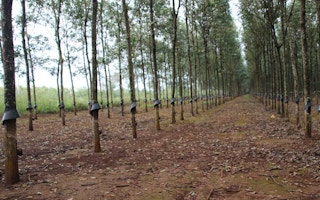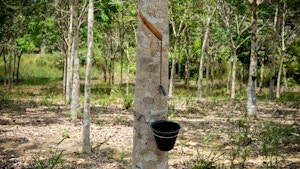When the Brazilian state of Sao Paulo instituted a quarantine in late March due to the Covid-19 crisis, Hevea-Tec, one of the country’s largest natural rubber companies, feared the worst. The firm’s demand from customers plummeted to almost zero in April, and by the time the quarantine was lifted in late June, it had recorded 73 per cent less business than usual for those three months.
Although natural rubber is an indispensable part of modern life, the industry has been battered by the coronavirus. In June 2020, the Association of Natural Rubber Producing Countries projected that the sector’s global supply and demand would fall by 4.7 per cent and 6 per cent respectively for the year, a sharp reversal from its forecast at the start of the year of a rise of 3.8 per cent and 2.7 per cent respectively.
With the rubber sector affected by quarantines and other restrictions, some sustainability initiatives have also been put on hold. Hevea-Tec, for example, had contracted a study of its natural rubber value chain and planned to establish an improvement programme. “Due to the limitations imposed by the quarantine, the study could not be performed and we had to postpone the project,” Anette Buuck, the company’s chief executive, told Eco-Business.
Protecting smallholders
Still, several firms have implemented measures to limit their emissions and protect rubber farmers’ safety and livelihoods during the pandemic.
In Cameroon, rubber company Corrie MacColl is monitoring employees’ body temperatures daily to identify possible infections early, and has mandated hand-washing every four hours across all work and living areas. It is also discouraging unnecessary movement and overcrowding through evening curfews, shorter working hours, and work-from-home arrangements where possible, and has painted ground markers to facilitate social distancing.
Its plantation hospitals have been designated as official Covid-19 testing centers by the government, and the company disinfects all villages and communal buildings twice every week, as well as the exterior and interior of all incoming vehicles. The company has also distributed soap and disinfectant kits to both employees and the villages surrounding its plantations.
Despite its drastic drop in business, Hevea-Tec continues to receive rubber from smallholders and industrial growers, albeit at a reduced frequency, and pay them for it.
Before the pandemic, smallholders delivered their rubber twice a month and were paid within a week of the deliveries. Now, they supply their rubber once a month and are paid within two weeks. Industrial growers who previously delivered rubber up to twice a month now do so monthly, and are paid within two months instead of within 25 days.
“Even this schedule has been very challenging because we do not have enough space to store all of the incoming rubber, but with the collective effort and collaboration of all of the players in our value chain, we are managing it. It is important to us that our smallholders and industrial growers can maintain their businesses and families,” said Buuck.
Although the firm had to shelve its study of its value chain, it has taken other steps to minimise its environmental impact. It now requires suppliers to dry their rubber before delivering it so that more of the material can be transported per trip. It is also testing alternative forms of packaging for the rubber deliveries that use less plastic than the current plastic boxes.
How to bounce back
Experts said that more can be done, especially for smallholders, who produce about 85 per cent of the global supply of natural rubber. The Brazilian government, for instance, has been proactive in helping companies by postponing tax payments, eliminating taxes for loans and creating financing mechanisms with low interest rates and long repayment periods. It has also extended financial aid to the needy, including rubber smallholders and tappers.
Rubber associations which count producers, processors, traders and buyers in their ranks could create a system of short-term loans for smallholders until the industry recovers from the pandemic, added Manjari Jayathilake, a National University of Singapore researcher who studies the sustainability and efficiency of rubber plantations in Southeast Asia.
“Smallholder rubber farmers and the rubber tappers that they employ have been the hardest hit by the Covid-19 situation, and some of these people are struggling to earn a living wage and to survive. Companies could take more responsibility for smallholder farmers. After all, they are an important part of the supply chain,” she said.
While most training workshops have been postponed due to lockdowns, rubber firms could connect with their suppliers virtually and provide advice, including best practices for sustainability. “Some companies were already creating short informational videos about best practices and sharing them with farmers online, even before the Covid-19 crisis,” she noted.
Over the longer term, encouraging farmers to diversify their rubber plantations, for example by cultivating fruits and vegetables alongside their rubber trees, is also key, since it increases their sources of income and reduces the plantations’ vulnerability to diseases. In China, farmers that intercrop earn twice the income of monoculture farmers, according to a study conducted in Hainan Island last year.
The Global Platform for Sustainable Natural Rubber (GPSNR), a non-profit set up in 2018 to ensure the sustainable production and supply of natural rubber, said that it is developing capacity-building initiatives and working with local partners to equip rubber smallholders with better farming material and knowledge of good agricultural practices to increase their productivity and income.
It is also involved in studies on the risks in the global natural rubber value chain and the gap between farmers’ current income and the amount that they need to survive, otherwise known as the living income gap.
“Despite their importance to the rubber sector’s sustainability, most smallholders live in poverty and lack social safety nets. The Covid-19 pandemic has only exacerbated these conditions for them,” said GPSNR director Stefano Savi.
He said: “It underscores the necessity for longer-term solutions to address the impacts of the volatility of the rubber market and ensure the resiliency of farmers to future crises, with industry and governments playing key roles too.”





















